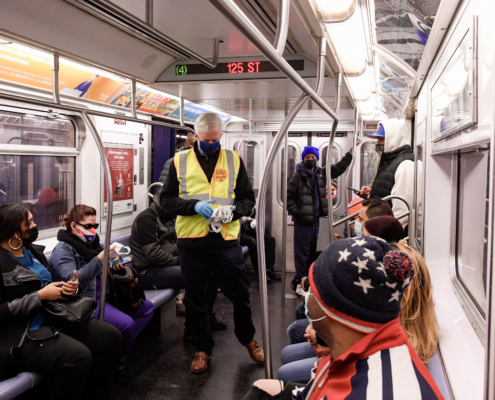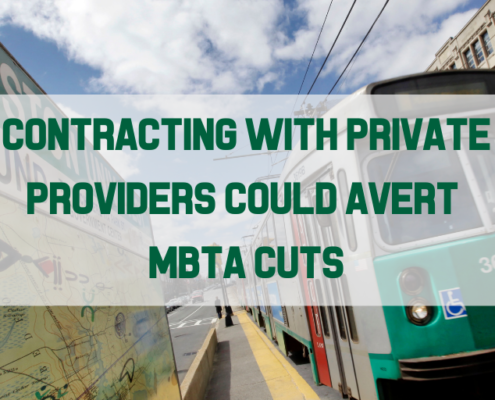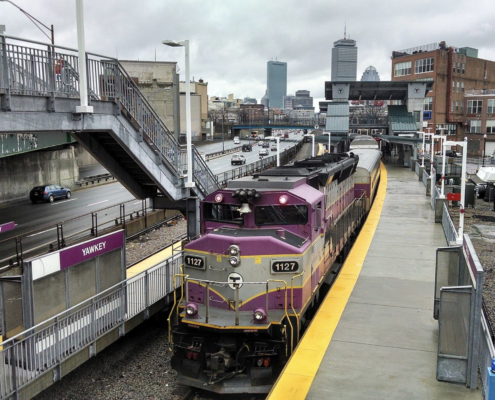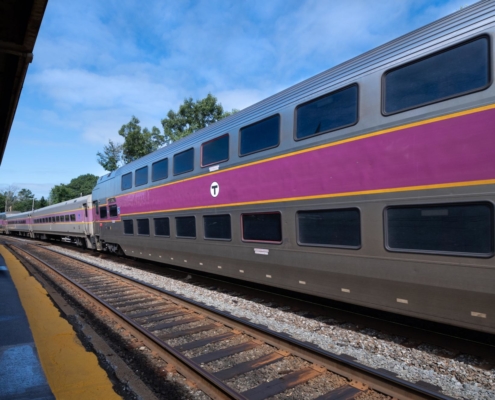 Metropolitan Transportation Authority of the State of New York from United States of America, CC BY 2.0
Metropolitan Transportation Authority of the State of New York from United States of America, CC BY 2.0 How Public Transportation’s Efficiency Changed During Covid
The MBTA's efficiency plummeted during Covid; as people chose either personal transportation or personal work, the MBTA lost significant ridership. However, it maintained its vehicle fleet and the depth of its services even as its operating cost per passenger mile increased dramatically.

MBTA Ridership Trends Compared to Public Transportation Agencies Nationwide
0 Comments
/
The COVID-19 pandemic had a devastating effect on our economy,…

Traffic Strikes Back: New Transportation Strategies for Post-Pandemic Prosperity
Host Joe Selvaggi talks with Chris Dempsey, Director of Transportation for Massachusetts, about road and mass transit innovations that could address traffic challenges in a high-growth, post-pandemic economy.

MBTA Cuts Ahead: COVID Causes Commuters To Consider Comprehensive Changes
Host Joe Selvaggi and Pioneer Institute Senior Fellow Charlie Chieppo discuss the reasons for the recently proposed cuts to MBTA service, and offer suggestions as to how the agency’s leadership could use this crisis to improve the service’s long-term health.

Contracting with private providers could avert MBTA cuts
In response to a collapse in MBTA service in the winter of 2015, the newly formed Fiscal and Management Control Board (FMCB) set the authority on a course of bold reforms. The COVID-19 pandemic is once again presenting new and significant challenges to T leadership that require a rethinking of how service is delivered to stave off painful service cuts.

Pioneer Institute Statement on MBTA Service Cuts
Even as MBTA ridership and revenue have been gutted by the COVID-19 pandemic, the system remains a lifeline for so many residents in the Greater Boston area, especially those working in essential services like health care or in industries most impacted by the pandemic such as the restaurant sector. Facing a crisis of this magnitude, T leadership must first do its all to rethink how it delivers services before reflexively making cuts.

COVID-19 Silver Lining: MBTA Takes Advantage of Ridership Lull to Accelerate $8.5 Billion Modernization Program
Pioneer Institute congratulates the Fiscal and Management Control Board (FMCB) and MBTA management for taking advantage of the precipitous ridership declines due to the COVID pandemic to dramatically accelerate ongoing construction projects.
 https://pioneerinstitute.org/wp-content/uploads/Screen-Shot-2020-07-14-at-12.14.12-PM.png
1512
2018
Max von Schroeter
https://pioneerinstitute.org/wp-content/uploads/logo_440x96.png
Max von Schroeter2020-07-15 11:50:362021-02-15 14:49:42A Time to Build
https://pioneerinstitute.org/wp-content/uploads/Screen-Shot-2020-07-14-at-12.14.12-PM.png
1512
2018
Max von Schroeter
https://pioneerinstitute.org/wp-content/uploads/logo_440x96.png
Max von Schroeter2020-07-15 11:50:362021-02-15 14:49:42A Time to Build
Survey Suggests Demand for Telecommuting After COVID-19 Crisis
Citing an avoidance of the commute and more flexible scheduling, nearly 63 percent of respondents to Pioneer Institute’s survey, “Will You Commute To Work When The COVID-19 Crisis Is Over?” expressed a preference to work from home one day a week, and a plurality preferred two to three days a week, even after a COVID-19 vaccine is available. Respondents cite social isolation as the biggest drawback of remote work. The survey was conducted from April 22nd to May 15th, and received responses from over 700 individuals.

It’s Time for the MBTA to Actively Engage Riders to Understand Their Commuting Plans
The MBTA should conduct a survey of mTicket app users regarding their future plans. Some may never work in offices again. Some will certainly do some workdays in the office and some at home. Others will be in offices and back to business as usual at some point.
Using their responses, the T can calculate ridership and determine projected revenue.

Study Highlights Transit Agency Best Practices in Response to COVID-19
The MBTA is taking a number of important steps to mitigate risks associated with the coronavirus, but some transit agencies around the country - from Philadelphia to San Francisco - have done significantly more, according to a new study that highlights the best practices of U.S. transit systems in response to COVID-19.

WILL YOU COMMUTE TO WORK WHEN THE COVID-19 CRISIS IS OVER?
How will you look at commuting in the future? This survey will ask over 30,000 people how their attitudes and habits will change. Please be part of our work to understand the changing world around us.
